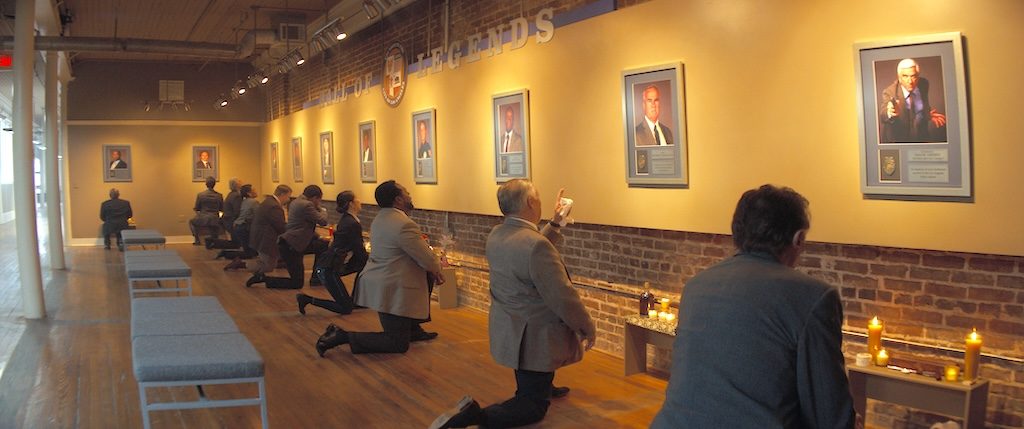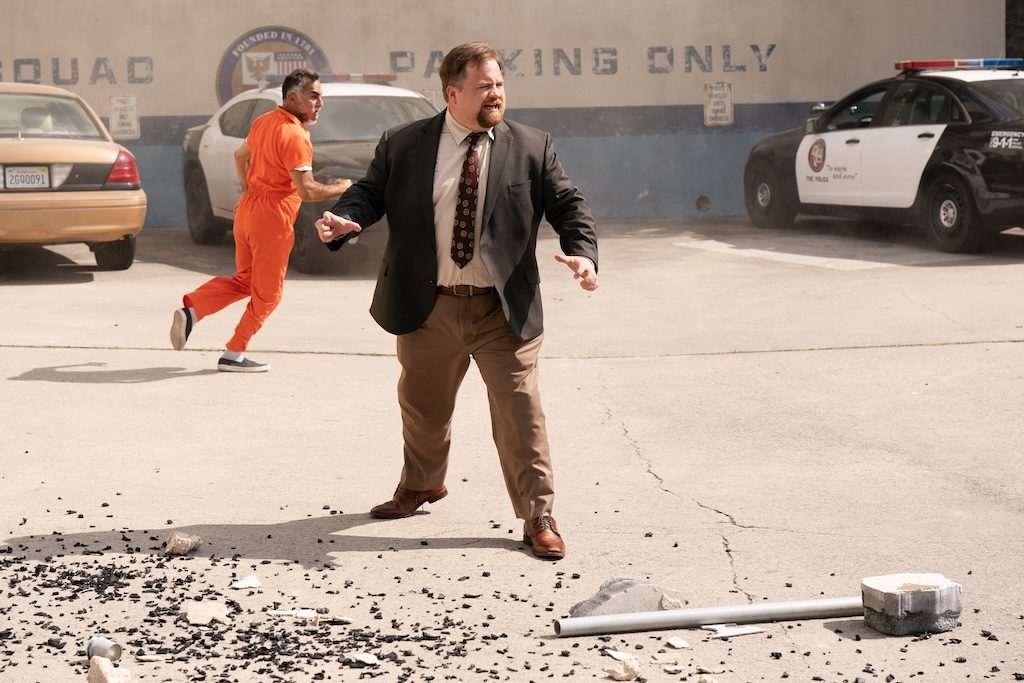The Art of the Smart Dumb Joke: Why “The Naked Gun” and Other Broad Comedies Work

By many accounts, The Naked Gun should not be considered a classic. Its humor is juvenile. Its characters are cartoonish. Its plots are barely held together with sight gags, puns, and glue. And yet, decades later, it remains wildly entertaining, rewatchable, and more expertly constructed than many so-called “serious” films.
This raises important questions for screenwriters: Why does a lowbrow, broad comedy like The Naked Gun work so well? What can writers learn from its success? And most importantly, how can these “silly” films be written better.
Let’s break down what makes these comedies tick and how to wield that knowledge when writing your own.
Comedy is a Carefully-Crafted, High-Density, Joke Machine
It’s easy to dismiss The Naked Gun as a string of stupid jokes. But that would ignore its most defining feature: precision and timing – even though it appears that the fire button on the silly string cannon is stuck for ninety minutes.
The jokes in The Naked Gun aren’t random—they’re engineered. Every frame is packed with gags, from background signs to physical humor to wordplay. This kind of density isn’t an accident. It’s structure. It’s intentional. It’s only made to look random.
Broad comedies thrive on setup and payoff, just like any other genre. The absurdity may disguise the technique, but don’t be fooled: comedy, especially lowbrow comedy, demands rigorous control of tone, rhythm, and escalation. Each gag has a reveal, a twist, or a left turn. Jokes are the building blocks of the comedy, not vice-versa.
The comedy is visual (what we see), verbal (what we see), situational (context of the scene), and relational (how the characters interact).
Scene Example: Drebin Jr. interrogates a suspect in a morgue, only to realize 10 minutes in that the body is the coroner. The suspect was standing behind him the whole time… also interrogating him. It’s a play on misdirection—but paced so quickly that the audience has to keep up.
The Straight Man Principle
In The Naked Gun, Liam Neesom’s Frank Drebin Jr. delivers outlandish lines with total sincerity. The characters are a straight man (or woman) in a preposterous world.
The world may be nuts, but the characters treat it like it’s Shakespeare. They are completely immersed in their world and believe it. The comedy arises not because the characters know they’re being funny—but because they don’t. They are not comics delivering jokes on stage. Once the characters become aware of the joke – it loses its effectiveness.
Scene Example: In a UN peace summit gone wrong, Drebin Jr. confidently walks into the wrong room and gives a passionate monologue to a group of synchronized swimmers in rehearsal. Not a glint of doubt in his face.

Frank Drebin Jr. i(Liam Neeson) Photo courtesy of Paramount Pictures.
Lowbrow Doesn’t Mean Lazy
There’s a misconception among writers that dumb, absurd jokes are easy. Nothing could be further from the truth. Slapstick, double entendres, running gags, malapropisms, visual jokes—these all require craftsmanship.
The Naked Gun is filled with jokes that reference everything from Shakespeare to baseball to American politics. Yes, it has fart jokes. But it also has jokes about police overreach, Cold War paranoia, and media sensationalism. Lowbrow doesn’t mean thoughtless—it means accessible.
Broad comedy works when it reaches a wide audience without dumbing everything down. You’re writing for people who might be tired, distracted, stressed—so the comedy needs to hit hard, fast, and with clarity – but most importantly- simplicity.
Broad comedies succeed when they make the audience feel smart, not dumb. Don’t talk down to your audience. Let them in on the joke. The humor might be silly, but when done right, it works.
Think of how The Naked Gun repeats certain gags or references earlier beats. It trains the viewer to notice, to connect, to participate.
Escapism is Not A Cheat
Critics often dismiss films like The Naked Gun as “escapist” as if that’s a negative. But escapism is not inherently shallow. In fact, in times of stress, absurdist humor can be a lifeline. Broad comedies are pressure valves. They allow people to laugh at the things that terrify, bore, or enrage them. It allows audiences a way to forget about real life for a while.
Escapist comedy can be satire. The Naked Gun parodies the police forces. It carries meaning beneath its slapstick.
Scene Example (2025): The Mayor of Los Angeles announces a new crime initiative—”Stop, Drop, and Selfie”—to distract criminals with influencer incentives. The police department must now upload arrest videos to TikTok for budget increases. It’s a cutting satire of both public policy and digital culture.
The Rules Of The World
One of the reasons The Naked Gun works is because it commits fully to the logic and rules of its world. It embraces the illogical.
It’s not our reality—but it’s consistent. The rules of physics, language, and behavior in that universe may be bent, but they’re bent evenly across all characters and situations.
This internal logic is key to sustaining disbelief. If anything can happen at any time, nothing matters. But if ridiculous things happen within an agreed-upon system, the audience stays on board.
Scene Example (2025): The police department is run by AI that keeps updating its terms of service mid-chase, and a villain who hides secret files inside QR codes tattooed on his back. It’s surreal—but consistent.

Photo courtesy of Paramount Pictures.
Every Character is a Joke Engine
In a good broad comedy, every character serves a comedic function. Frank Drebin Jr. is the deadpan chaos engine.
Every character in a smart dumb comedy should contribute to the humor. Whether through archetype, contradiction, or exaggeration, each person is a “joke engine” with a distinct purpose. One may ground, another may misdirect.
Character Examples:
- Chief Turbo: A police chief who only speaks in acronyms—none of which are ever explained.
- Agent Sasha Flux: A femme-fatale tech analyst who believes every problem can be solved by rebooting something, including people.
Joke Density vs. Joke Quality
There’s a myth that quantity beats quality in broad comedy. It’s true that films like The Naked Gun fire off a joke nearly every 10–15 seconds. But this doesn’t mean writers should spray and pray.
Joke density works only if you understand pacing and rhythm. A well-timed silence can be just as funny as a visual gag. And sometimes the best way to set up a big laugh is to wait. Audiences need room to breathe and reset otherwise you’ll wear them down.
Repetition and Callback
Many jokes in The Naked Gun are funny because they’re repeated, twisted, or paid off later.
Scene Callback (2025): In act one, Drebin Jr. accidentally tells a grieving widow, “Your loss is our gain.” It’s awkward. By act three, he’s trying to negotiate with terrorists—and the same line comes out again. This time, the terrorists applaud and release the hostages, thinking it’s a proverb.
This is how repetition becomes reward. The joke evolves and surprises by repeating it in a new context. Otherwise, you’re jsut reusing jokes.

Ed Hocken Jr. (Paul Walter Hauser) Photo courtesy of Paramount Pictures
The Rhythm of Comedy
Broad comedies live or die by comic rhythm. Just like music, comedy needs beats, pauses, and climaxes. A great film knows when to pause for a laugh—and when to bulldoze right through it for surprise. Give your jokes time to land. Not every gag needs to be a “sock it to them” punchline.
Scene Example (2025): Drebin Jr. delivers a heartfelt eulogy—only to realize halfway through he’s at the wrong funeral. The moment should be followed by a laugh pause. Instead, he doubles down, starts singing, and gives away his badge mid-song. It turns awkwardness into escalation.
Final Thoughts
It’s time we stop treating lowbrow, broad comedies as lesser. Films like The Naked Gun, Airplane!, Anchorman, and Dumb and Dumber endure not because they’re dumb—but because they’re smart about being dumb.
As a writer, you have the opportunity to make people laugh in ways that feel both effortless and precise. But you must respect the form. Broad comedy is not just entertainment. Honor the emotional logic of the characters.
It’s the difference between a joke writer and a comedy architect.
Like what you read?
Subscribe to Creative Screenwriting Magazine for more craft deep-dives, script breakdowns, and interviews with today’s most innovative comedy writers.
Get reely good feedback on your film or television script from Frank or Beth
Join the Discussion!
Related Articles
Browse our Videos for Sale
[woocommerce_products_carousel_all_in_one template="compact.css" all_items="88" show_only="id" products="" ordering="random" categories="115" tags="" show_title="false" show_description="false" allow_shortcodes="false" show_price="false" show_category="false" show_tags="false" show_add_to_cart_button="false" show_more_button="false" show_more_items_button="false" show_featured_image="true" image_source="thumbnail" image_height="100" image_width="100" items_to_show_mobiles="3" items_to_show_tablets="6" items_to_show="6" slide_by="1" margin="0" loop="true" stop_on_hover="true" auto_play="true" auto_play_timeout="1200" auto_play_speed="1600" nav="false" nav_speed="800" dots="false" dots_speed="800" lazy_load="false" mouse_drag="true" mouse_wheel="true" touch_drag="true" easing="linear" auto_height="true"]










You must be logged in to post a comment Login